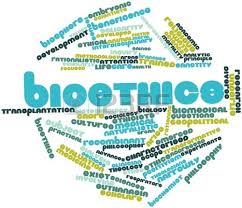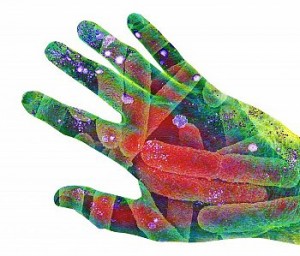
An intersection of bioethics and epigenetics in policy, practices, and science affecting the Muslim World: a case for a wider definition.
by Brian Marlatt
The intersection of bioethics and epigenetics is a meeting of the subjective and the objective. It may be described as the meeting of ethical choices made according to values both subtle and overt held by practitioners of science and medicine, or of policy-makers and of science itself, in this case the science of epigenetics.
What are bioethics and the science of epigenetics?
Bioethics is a social science concerned with the practice of science. It is an academic discipline concerned with the making of ethical choices, particularly the ethics of medical and biological research. Bioethics concerns the values and the expression of values guiding choices we make in areas related to the biological sciences.
Value expression in bioethics is ethical choice. It represents the social, cultural, political, religious or other belief system priorities in society, in academic disciplines, and in public policy. It manifests as policy choices and choices of practice in science and life we make every day. They arise in fundamental questions about human life, life’s end and beginning. But also in questions of every day practical consequence. What we eat and drink, how we and others change what we eat or drink or put into our environment, are all choices of policy and practice within bioethics.
Unless prioritized as an overarching principle, religion in the form of Islamic bioethics is a distinct and separate area of inquiry. For the purposes of this discussion bioethics will be understood within a secular context.
Epigenetics is science, a new science about external factors moderating genetic expression during the life of an organism, including human life. Epigenetics is a rapidly evolving field of scientific Inquiry concerning heritable genetic expression influenced by nutritional, environmental, and behavioural variables affecting genes, without change to underlying DNA sequences. This may result from a host of human activities about which ethical choices may be made, including how food sources (sources of nutrition) are chosen or created, for example by changing the biochemical make-up of food and sustaining the purity of water supply, by providing controls on contaminants derived from industrial or commercial activity (environmental factors) and by priorities including agricultural practice, ensuring food security, and conditions of life (behavioural).
The mechanisms of epigenetic effect may have far-reaching consequences and thus in choices made. Networks of chemically-induced triggers or influences, turning genes on or off as switches throughout the life of an individual or organism, whether a variety of grain, livestock or human being, affect development within single lifetimes or several generations, that is to say epigenetics is transgenerational. Thus, the outcomes of bioethical choices having epigenetic affect, may reach beyond present generations.
 What is the biological basis of epigenetic effect?
What is the biological basis of epigenetic effect?
Biochemical interactions at the molecular level between genes correspond to the presence or absence of good nutrition, environmental factors affecting gene expression, and conditions of life or stress affecting ability to access beneficial nutrients or to lessen exposure to harmful inputs. For example, the packing material of DNA, referred to as histones, may be modified to turn on or off genes individually or in networks of cells by acetylation or methylization of histones without change to the genes themselves. The changes may be passed on during cell division for expression at different points in the life of individual organisms or persons and under different external influences. These changes can be heritable between generations.
Expression of genes or networks of genes thus activated or deactivated permanently or in discrete periods within the life of individuals, may have degrees of significance ranging from benign determination of cell form and function, to the potentially life-ending, for example when genes suppressing tumour growth are turned off. It is this network of chemical switches within cells, referred to as the epigenome, which responds to nutritional, environmental and behavioural variables. By better understanding the science of these interactions, of these chemical switches or triggers, bioethicists are better positioned to guide evaluative choices grounded in comparative values about questions as far-reaching as public health and the environment. The intersection of bioethics and epigenetics concerns interaction of these variables.
An intersection of bioethics and epigenetics
An intersection of bioethics and epigenetics exists where choices based on the values of society, meet change in the natural world affecting human life caused by human interventions.
How we change nutritional intake by introducing Genetically Modified Organisms (GMOs) to increase crop yields at a cost to nutritional content or metabolic rate, introduce environmental inputs in the form of byproducts and pollutants, and change behaviour in ways increasing susceptibility to disease or change to conditions of life, cause epigenetic effect, raising new questions in bioethics about choices based on competing values.
Commercial and national economic priorities and practice where the science of epigenetics identifies risk or benefit and therefore calls for risk analysis and evaluation to inform choices.
Yet, bioethics as an activity is commonly understood to imply choices in health care, health science, life sciences, and the ethical standards of choices in these areas. Bioethics is commonly understood to concern questions and choices about the beginning or end of life, quality of life, how we treat with respect the gift of life and the duty of care for others.
Accordingly, in a University of Chicago 2014 workshop, Mapping Out an Islamic Bioethics healthcare, providers and religious leaders met to chart ways to bridge gaps between modern medicine methodology and Islam-based ethical-legal values framing choices. Similarly, the Georgetown University Islamic Medical and Scientific Project funded by the Qatar Research Council exists to provide a comprehensive collection of scholarly resources pertaining to Islamic perspectives in bioethics. However the bioethics of epigenetics remains largely outside research direction and resources of this kind perhaps because of a focus on bioethical choices in the practice of medicine rather than the medical implications of choices having epigenetic effect.
What must be understood is that choices made outside of the community of shared values held within the geographical Muslim community most concerned, may be for exclusively economic or conflicting evaluative priorities. In making choices of practical bioethical consequence, science must be a chief part of decisions involving risk analysis and risk reduction. The science concerned may be epigenetics.
Brian Marlatt is a Canadian writer with interests in science, the history of science, and public policy.
You must be logged in to post a comment.